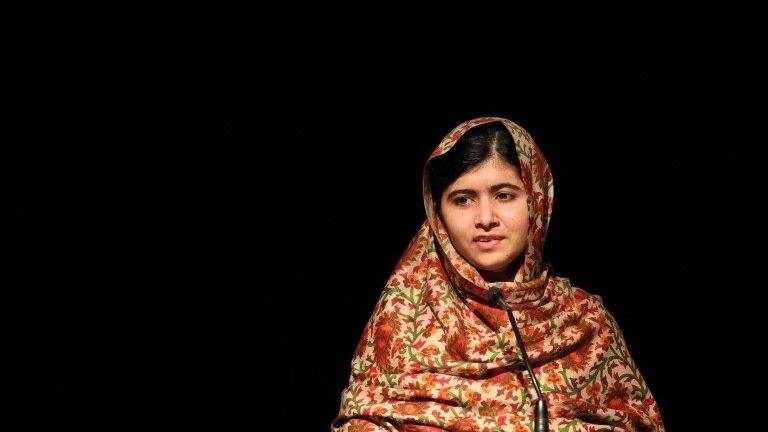Malala and Kailash Satyarthi receive joint Nobel award
- Published
Kailash Satyarthi: "I refuse to accept that the shackles of slavery can ever be stronger than the quest for freedom"
Pakistani education activist Malala Yousafzai and Indian child rights campaigner Kailash Satyarthi have received the Nobel Peace Prize awards.
The Nobel committee described both laureates as "champions of peace".
Ms Yousafzai said she was there to stand up for the rights of forgotten and frightened children, and raise their voice rather than pity them.
Mr Satyarthi said receiving the prize was "a great opportunity" to further his work against child slavery.
Ms Yousafzai and Mr Satyarthi received their awards from the chairman of the Norwegian Nobel committee, in the presence of King Harald V of Norway.
They delivered their Nobel lectures during the award ceremony.
'I am many'
In her speech, Ms Yousafzai said the award was not just for her: "It is for those forgotten children who want education. It is for those frightened children who want peace. It is for those voiceless children who want change.
"I am here to stand up for their rights, raise their voice. It is not time to pity them. It is time to take action so it becomes the last time that we see a child deprived of education."

At the scene: By Lyse Doucet, BBC chief international correspondent
It was a day when Indian saris and Pakistani shalwar kameez blended with finely cut Western suits.
It was a moment when the best of musical traditions from East and West filled the elegant Oslo Town Hall - a stirring Raga for Peace, South Asian Qawwali, a haunting rendition of Oh Holy Night.
But the voices which resonated most loudly were those of the Nobel Laureates.
Kailash Satyarthi ended his Nobel lecture with "Let us March!" and Malala Yousafzai declared 'Let us begin today!" Both see one of the world's most distinguished honours as a weapon in their fight for every child's right to be educated, and not to work in childhood.
Nobel organisers say there have never been such standing ovations or so many accredited journalists. But will this prize do even more to achieve the goals it has honoured - to champion children's rights?

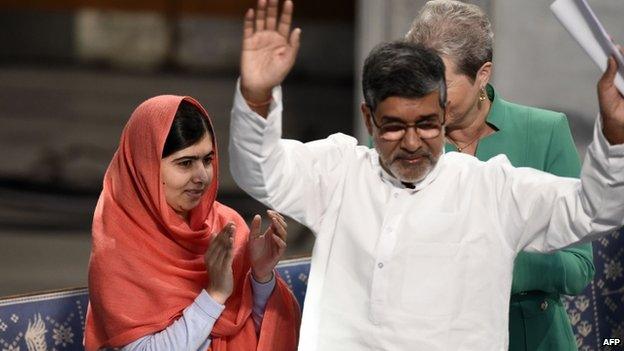
The laureates were described as "champions of peace"
Ms Yousafzai, 17, was shot in the head by Taliban gunmen in October 2012 for campaigning for girls' education and now lives in the UK.
She is the youngest-ever recipient of a Nobel prize.
She said she had brought other girls with her to Oslo with similar stories, among them two classmates shot alongside her by the Taliban.
Ms Yousafzai said she was dedicating the prize money to the Malala Fund, "to help give girls everywhere a quality education and call on leaders to help girls like me..."
"I will continue this fight until I see every child in school," she added.
"I feel much stronger after the attack that I endured, because I know, no-one can stop me, or stop us, because now we are millions, standing up together."
Malala Yousafzai: "If I can serve my country best through politics and through becoming a prime minister then I would definitely choose that"
'Indescribable courage'
In his speech earlier, Mr Satyarthi said he was "representing the sound of silence" and the "millions of those children who are left behind".
He said he had kept an empty chair at the ceremony as a reminder of the children without a voice.
"There is no greater violence than to deny the dreams of our children," he said.
"I refuse to accept that the shackles of slavery can ever be stronger than the quest for freedom," he added, to applause.
Nobel committee chairman Thorbjorn Jagland stressed the importance of education, saying: "The road to democracy and freedom is paved with knowledge."
Mr Jagland praised Mr Satyarthi's work campaigning against child labour, often at great risk to himself.
He also lauded Ms Yousafzai's efforts to promote education despite threats from the Taliban, saying: "Her courage is almost indescribable".
Indian and Pakistani leaders congratulated the laureates.
Pakistani radio quoted Prime Minister Nawaz Sharif as saying: "The dream of Malala regarding girls' education shall be realised."
His Indian counterpart Narendra Modi tweeted, external: "The entire nation watches the ceremony in Oslo with great joy & immense pride. Congratulations @k_satyarthi!
"I also congratulate the young Malala Yousafzai for the momentous achievement."
Through the efforts of Mr Satyarthi, 60, tens of thousands of children have been rescued from hazardous industries.
He has endured death threats for his work, and two of his colleagues were killed.
Ms Yousafzai and Mr Satyarthi were jointly awarded the 2014 Nobel Peace Prize "for their struggle against the suppression of children and young people and for the right of all children to education".
They have split the $1.4m (£860,000) prize money.
'I speak up for my sisters' - Malala

Nobel peace prize
95
Nobel Peace Prizes have been awarded 1901-2014
-
16 women have been awarded the prize, including Malala Yousafzai
-
17 Malala's age, making her the youngest ever laureate
-
62 average age of laureates when they were awarded the prize
-
3 laureates were under arrest at the time of the award: Carl von Ossietzky, Aung San Suu Kyi & Liu Xiaobo
- Published10 December 2014
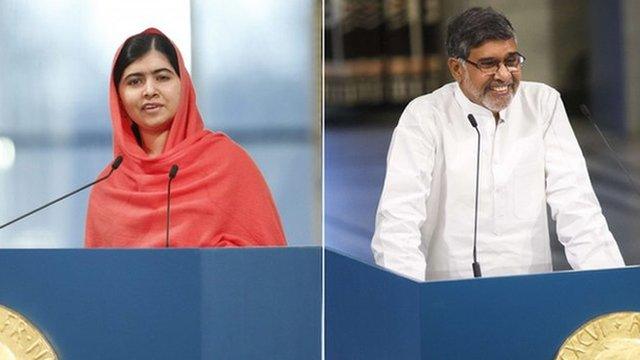
- Published10 December 2014
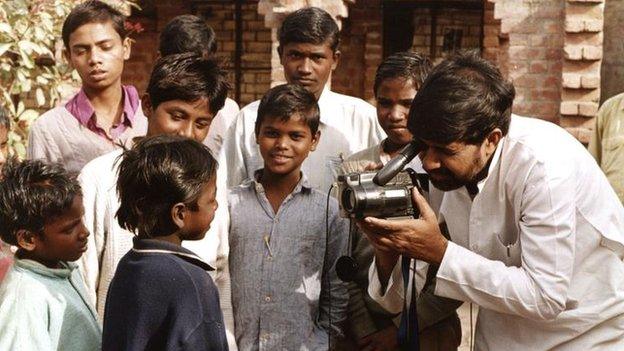
- Published17 August 2017
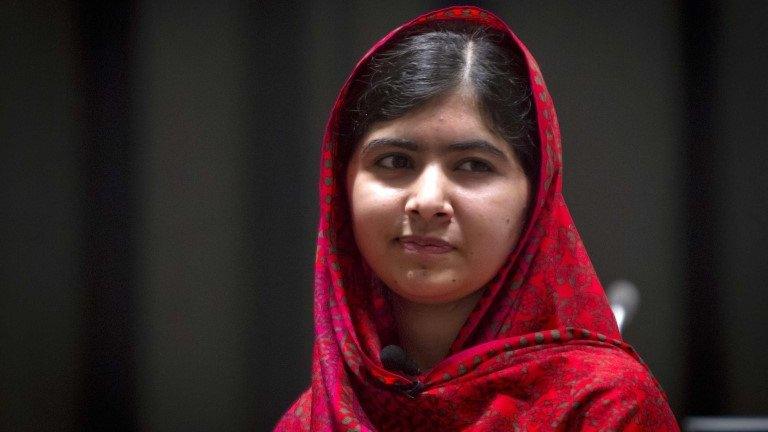
- Published9 December 2014
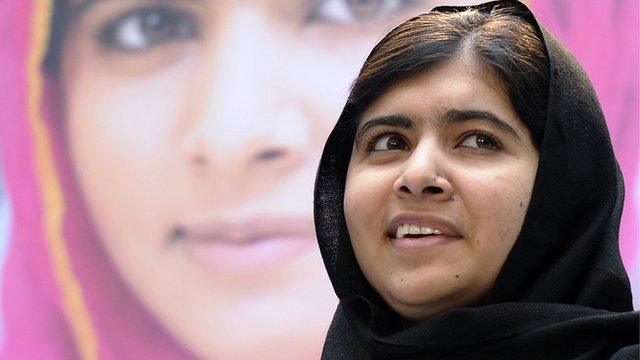
- Published10 December 2014
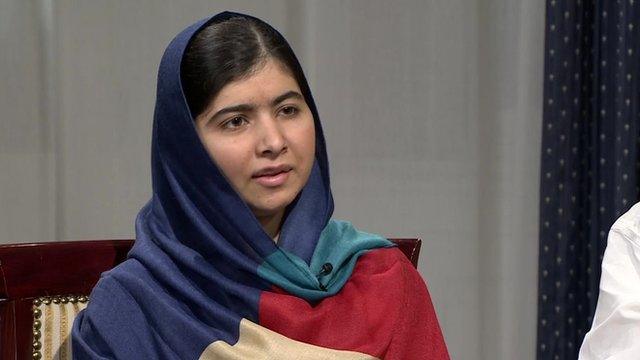
- Published10 October 2014
